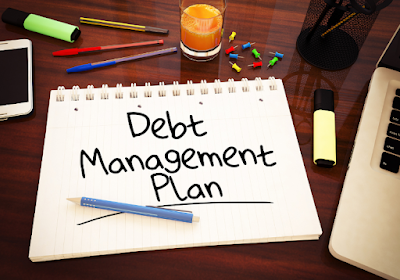Finance Tips You Need to Know: How to Manage Debt
Finding
yourself in over your head? You're not alone. Debt is, unfortunately, a fact of
life for all of us these days, regardless of whether we're big spenders or
conservative savers. However, many people are still not aware of the options
they have to get rid of this problem. Here are some tips you can use if you're
looking for help with debt management.
Define the
Scope of Your Debt
The scope of your debt is the total amount you owe. It can include any balances on credit cards, student loans and medical bills, as well as unpaid taxes or child support. It's important to define the scope of your debt before you make a plan to tackle it. The following questions may help you analyze your financial situation and make decisions that will improve it.
What's the total amount of debt?
What sources of income do I have?
How much can I afford to pay toward my debt each month?
What is my credit score?
Pay More than Minimum Payment
Focus on paying off those debts that incur the highest interest rates first.
Paying more than the minimum payment is a good way to avoid paying additional interest on your credit card debt. The best way to avoid debt is to pay off your balance in full each month.
If you can't afford to pay off your entire balance, you should at least pay more than the minimum amount due each month. Paying more than the minimum will help you pay down your debt faster and save money in interest charges. For example, if your credit card bill is $500 and the minimum payment is $25, paying only $25 will take you 30 years to pay off your balance. Paying $50 per month will take you 10 years to pay off your balance, but paying $100 per month will reduce that time period to 7 years.
Cut up your credit cards
If you want to get out of debt, the first step is to stop using credit cards.
It won't be easy at first, but soon you'll learn how to live without them. With practice, it will become easier.
Here's how:
1. Cut up your credit cards. It might seem obvious, but in practice it can be difficult. If you have a hard time cutting up plastic, try this trick: cut up an old credit card and put the pieces in a baggie or jar by your front door so that every time you leave for work or run errands, you see them there (or in your car if you're afraid of losing them). You might have to do this for a month or two until the idea of having no credit becomes more real than having one.
2. Stop charging purchases and pay cash instead. This one is harder for many people because they get used to paying with plastic and then don't know how much money they have left at the end of each month (or week). But if you plan ahead by saving up enough cash beforehand so that you won't need extra money in your account during certain weeks or months
Consider talking to a financial advisor or debt management company
Consider talking to a financial advisor or debt management company like creditloan.com that offers short-term financial solutions for people who struggle with bad credit.
These professionals can help you come up with a plan that will allow you to pay off your debt in a reasonable amount of time — and without it costing you more money than necessary. They also often have access to lower interest rates on your credit cards than you might be able to negotiate on your own.
Cut down on expenditures, or simply find ways to spend less money
Cutting back on your expenses is a great way to save money, but you don't have to cut back on everything. In fact, it's often better not to do so. For example, if you're used to eating out every day for lunch and decide that instead you'll bring your lunch from home, this will save you money in the short term but may actually end up costing more than buying lunches out. The reason is that when we cut back on spending in one area of our lives, we often compensate by spending more in another area. So if you stop eating out at restaurants or fast-food joints, then chances are good that you'll be eating more snacks at home because they're convenient and cheap.
Cut unnecessary expenses and prioritize your bills so that you can pay off the most important ones first.
Create a budget and stick to it
Create a realistic budget. Become aware of your spending patterns. To begin cutting back on expenditures and spending less money, start by becoming aware of where your money goes each month. Write down all of your expenses for one month and add them all up.
Find a side hustle
Earn extra
income on the side. Find another income source like doing part-time jobs
or freelance work through Fiverr, Upwork and more.
Go on garage sale, sell items you don't need.
The key is to find something that you enjoy doing and can do consistently — that way you'll never get bored and your side hustle will be able to grow into something bigger.
Hopefully these
tips on how to manage and tackle debt will help you build a better financial
future for yourself and your family.




Comments
Post a Comment